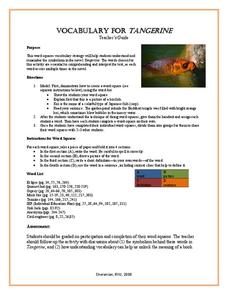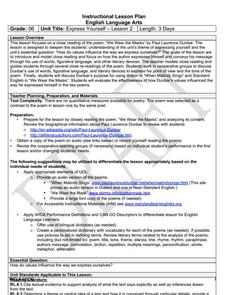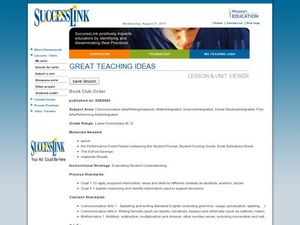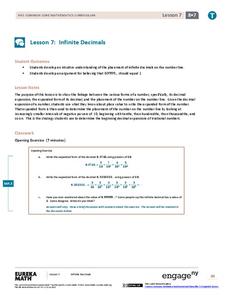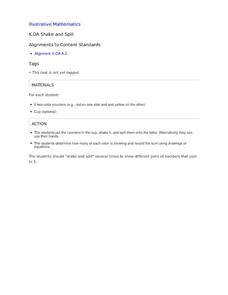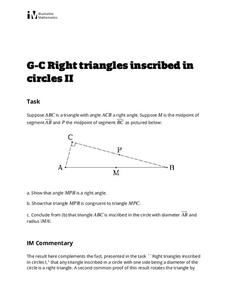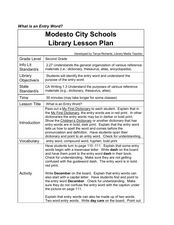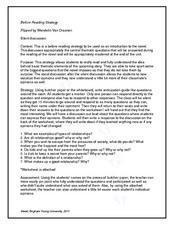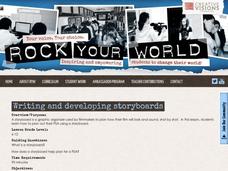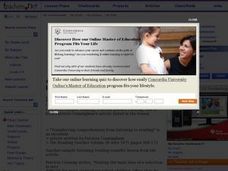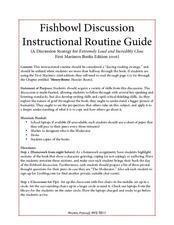Code.org
The Need for Programming Languages
LEGO see if you can recreate my design. Individuals build an arrangement from LEGO blocks and write directions for someone else to follow in order to recreate the arrangement. Pairs then swap directions and try to replicate the original...
Code.org
APIs and Using Functions with Parameters
Introduce your class to the API, a reference guide that lists and explains the functionality of programming language. Using JavaScript, individuals draw complex designs that require additional commands and parameters defined in the API...
Curated OER
Tangerine: Vocabulary
Here's a great way to make vocabulary words drawn from Edward Bloor's novel Tangerine memorable. Kids create a word square, and in one quadrant write the word. A picture goes in a second quadrant, the definition in a third, and a...
Curated OER
6th Grade: Express Yourself, Lesson 2: Close Read
The second lesson plan of a pair about Paul Laurence Dunbar, this plan focuses in particular on his poem, "We Wear the Masks." After a short historical introduction, class members conduct a series or readings, marking up the text and...
Curated OER
Book Club Order
Students complete a simulated book order form for their class. In this book club lesson, students budget and plan an order form for their fellow students, discussing why they chose specific books.
Mathematics Assessment Project
Building and Solving Linear Equations
Young scholars write and solve linear equations in one variable based on descriptions of the operations that are applied to the unknown variable in an algebra machine. They then create their own problems for classmates to solve.
EngageNY
Infinite Decimals
Can you support the argument that the decimal 0.99999 ... is equivalent to the number one? The seventh installment in this 25-part module gives convincing support for this conclusion. Pupils write infinite decimals using powers of 10....
Illustrative Mathematics
Shake and Spill
Entertaining as well as educational, this math activity about decomposing numbers is bound to capture the engagement of young learners. Given a cup and five two-color counters, young mathematicians simply shake and spill the cup,...
Illustrative Mathematics
Right Triangles Inscribed in Circles II
So many times the characteristics of triangles are presented as a vocabulary-type of lesson, but in this activity they are key to unraveling a proof. A unique attack on proving that an inscribed angle that subtends a diameter must be a...
Curated OER
Dictionary Work - Entry Words
Second graders examine the use of entry words in the dictionary. For this dictionary use lesson, learners look at guide words in a children's dictionary as the teacher/librarian describes the characteristics of each entry. They complete...
Curated OER
Sense Poetry
Access your young poets' senses and emotions with this activity, which guides them through the process of writing a "sense poem." After working on a sense poem as a class and modeling the procedure, individuals work on their own poems...
Curated OER
Flipped: A Before Reading Strategy
Prior to reading Flipped, Wendelin Van Draanen’s young adult novel about teen romance, class members engage in an anticipation guide activity. Individuals post their responses to a series of prompts, and after reading all the responses,...
Curated OER
Three Little Pigs: Human, Natural and Capital Resources
First and second graders will learn about natural, capital , and human resources through the story The Three Little Pigs. They will listen to the story, write down what they know about straw, wood, and brick, then complete a chart...
Curated OER
Hobbies
How many different hobbies can you name in French? Using this question, French classes are asked to list as many hobbies as they can. Although the activities themselves are not included in this teacher guide, you could create them...
Curated OER
The Raven
After a close reading of Edgar Allan Poe's "The Raven" individuals copy the rhythm and rhyme scheme and rewrite the final stanzas of the poem.
Curated OER
Fiction vs. Nonfiction
Young scholars explore fiction and nonfiction writing. They identify the elements of fiction in a short story and identify the criteria necessary in a nonfiction piece. Students distinguish the author's purpose in an expository text,...
Creative Visions Foundation
Writing and Developing Storyboards
Storyboarding is an essential part of planning a film. Introduce your class to storyboarding and allow groups time to plan out their documentaries in this sixth lesson in a series about creating documentaries. Class members review an...
Teaching Oasis
Gingerbread Baby Lesson Plan Guide
Reinforce reading comprehension and story mapping skills with the help from a story, Gingerbread Baby by Jen Brett. Individuals discover new vocabulary, make predictions, retell main events, respond to reading using a graphic organizer,...
Curated OER
Frankenstein Anticipation Guide
Before your high schoolers embark on the journey of Mary Shelley's Frankenstein, provide them with this prereading activity. Independently, they respond to seven statements that connect with the novel. For example, they must decide if...
Curated OER
Mississippi Trial, 1955: Anticipation Guide
As an introductory activity to Mississippi Trial, 1955, class members use color-coded dots to respond anonymously to a series of statements about prejudice and responsibility to their fellow-man that are posted about the room. The...
Curated OER
Ordinary People: Anticipation Guide
Activate your pupils' thinking before reading chapter five of Ordinary People. Learners decide whether they agree or disagree with six statements and discuss their ideas in small groups. They then read chapter five and determine if a...
Curated OER
Guided Reading: Main Idea
Readers are presented with a list of three questions and asked to actively listen to a story or article to answer them. They verbally answer the questions to learn the strategy. Next, read a story to them or have them silently read a...
Curated OER
Extremely Loud and Incredibly Close: Fishbowl Discussion Instructional Routine Guide
What exactly does make life worth living? In preparation for a fishbowl discussion of Extremely Loud & Incredibly Close, readers of Jonathan Safran Foer’s novel highlight sections that show a character grieving, coping, or suffering...
Curated OER
Finders Keepers: Vocabulary Instructional Routine Guide for Extremely Loud and Incredibly Close
Like Oskar, the curious boy in Jonathan Safran Foer’s story, class members journey through other “stories that the mouth can’t tell” to find another sentence that uses a word found in novel. Individuals create their own vocabulary list,...




